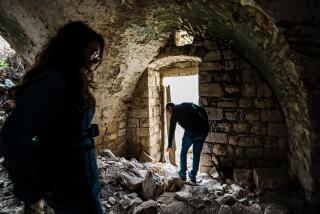Lebanon’s prime minister resigns, heightening uncertainty
BEIRUT — A day after announcing his resignation as prime minister, Najib Mikati on Saturday called for a “salvation” government to run deeply divided Lebanon amid grave concerns about ongoing instability and increasing spillover effects from the war in neighboring Syria.
President Michel Suleiman accepted Mikati’s resignation Saturday, and the outgoing prime minister agreed to head a caretaker government until his replacement is named.
Mikati, 57, stepped down as lawmakers remained deadlocked about a long-debated election law and the future of the nation’s internal security forces chief.
The resignation heightened a sense of uncertainty that has deepened as the fighting next door in Syria has escalated, dividing the sympathies of Lebanese who fear the violence will spread further on their side of the border.
Lebanon’s two major political blocs have backed opposing sides in the Syrian conflict, though the government has remained officially neutral.
Mikati’s announcement came as deadly clashes raged in his hometown, the northern city of Tripoli, between Lebanese supporting beleaguered Syrian President Bashar Assad and those in favor of his ouster.
“I have sought, as much as I could, to preserve Lebanon and keep it away from erupting volcanoes,” said Mikati, who has served as prime minister since June 2011.
National parliamentary elections are scheduled for June. But even before Friday, it was unclear whether the balloting would take place then because lawmakers have been unable to agree on an election law.
Suleiman is responsible for choosing Mikati’s successor, who would be subject to a vote of confidence from the fractious parliament. Many observers expect a prolonged period of political jockeying as varying camps try to build a majority.
International observers voiced fears that the political vacuum could heighten instability in Lebanon, a nation of 4.5 million that has a volatile history and sits astride some of the region’s major sectarian and political fault lines.
Lebanon endured a devastating, 15-year civil war that ended in 1990 but remains a vivid reminder of the country’s fragility.
Of the two major blocs, one is generally seen as pro-Western, while the other is close to Iran.
Dominating the legislature is a coalition headed by Hezbollah, the Shiite Islamist organization listed by the United States as a terrorist group. Hezbollah is a close ally of Iran and Assad.
Some critics have called Mikati too close to Hezbollah, though he has had his differences. The prime minister’s defenders have praised him as a moderate who managed a shaky government with a steady hand amid Lebanon’s recurring political crises.
Syrian forces entered Lebanon in 1976 after the outbreak of the civil war and remained for almost three decades. In 2005, they were forced to pull out after street protests amid allegations of involvement in the truck bombing assassination of former Lebanese Prime Minister Rafik Hariri. Syria and Hezbollah denied any role in the attack, though a special United Nations tribunal has issued an indictment against four Hezbollah members in connection with the slayings.
Since the rebellion against Syria’s Assad erupted two years ago, more than 400,000 Syrian refugees have flooded into tiny Lebanon, taxing resources and raising tensions. The Syrian conflict and its strong sectarian undertones have also heightened religious strains in Lebanon, where a delicate balance of power exists among various Christian and Muslim sects.
Mikati, a telecommunications billionaire, came close to resigning on two previous occasions, most recently in October, when a car bomb in a mostly Christian district of Beirut killed the head of police intelligence, a fierce adversary of the Syrian government. Various Lebanese politicians accused Syria or its allies of being behind the blast, though no one has been charged.
More to Read
Start your day right
Sign up for Essential California for news, features and recommendations from the L.A. Times and beyond in your inbox six days a week.
You may occasionally receive promotional content from the Los Angeles Times.






